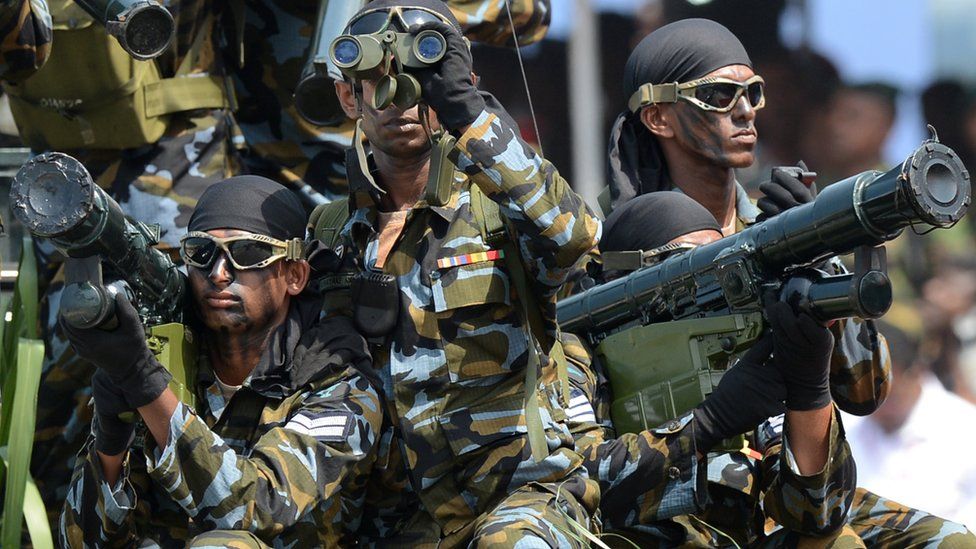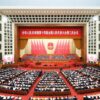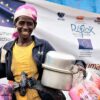Memories of the dark cell and constant fear for his life still haunt Murugiah Komahan, who spent six years in prison on anti-terrorism charges in Sri Lanka.
Mr Komahan, 40, is among thousands of Tamils and others detained under the Prevention of Terrorism Act (PTA) in recent decades.
Successive governments dominated by the Sinhalese majority used the PTA primarily to arrest those suspected of links with the separatist Tamil Tigers until the rebels’ defeat in 2009.
But more than a decade after the civil war ended, the act is still in use and Sri Lanka is under pressure to reform it.
The island’s access to lucrative export markets in Europe depends on it making progress on human rights.
Mr Komahan, who’s from northern Jaffna region, was first arrested under the anti-terrorism act in 2010 on charges of links with the rebels.

“Police tried to force me to sign a confession but when I refused, I was severely beaten. An officer even threatened to shoot me. When I complained to a judge about being tortured, I was beaten even more,” Mr Komahan told the BBC.
Finally, he said, he signed a confession in Sinhala, a language he doesn’t understand. He was worried that if he refused, he might be sent to solitary confinement.
A court freed him in 2016 for lack of evidence – but Mr Komahan says he is still being monitored by intelligence agencies.
“The constant surveillance is making it difficult to return to a normal life,” he says.
Rights groups say the PTA has been used to make arbitrary arrests, to detain people for years without due legal process and to extract false confessions under torture, accusations the authorities deny.
It was first introduced as a temporary measure more than 40 years ago, when the insurgency for a Tamil homeland was in its early stages. But it’s also been used to target other minority groups, government critics and civil society activists over the years, campaigners say.
This video can not be played
To play this video you need to enable JavaScript in your browser.
“We have cases of people who spent several years in prison before they were discharged – that means there was no evidence and no indictment was filed,” said Ambika Satkunanathan, a prominent human rights activist.
She alleges the PTA was used to target Muslims after the island’s 2019 Easter Sunday bomb attacks by Islamist militants.
These include prominent Muslim lawyer Hejaaz Hizbullah, a vocal opponent of President Gotabaya Rajapaksa. He was released on bail in January amid growing international criticism after spending almost two years in detention.
According to the Sri Lankan prison authorities, there are still nearly 300 people detained under the PTA, some of whom have been held for more than a decade.
Following years of criticism, the government has now tabled amendments to the act with “the objective of bringing it in line with international norms and best practice”.
Justice Minister Mohamed Ali Sabry told the BBC: “One of the key provisions in the amendments is if the indictment is not filed for more than a year, then the detainee can apply for bail.”
He said officials were trying to expedite pending anti-terrorism cases and 86 people had recently been released.
But campaigners say the proposed changes do not go far enough. For example, “a confession given to an assistant superintendent of police or above can still be used as evidence in trial”, Ms Satkunanathan said.
The United Nations Human Rights Council (UNHRC), which is holding its spring session in Geneva, and others are watching closely. Another critical assessment by the council later this year would not augur well for Sri Lanka.

The European Union has already warned it will suspend tariff free access for Sri Lankan companies if there is no progress on human rights. The island’s exporters sent garments worth more than $2bn to the bloc in 2020.
Given Sri Lanka’s foreign exchange reserves crisis, a bailout from the International Monetary Fund looks on the cards.
Last month, UN Human Rights chief Michelle Bachelet acknowledged the Sri Lankan government had taken some steps in addressing human rights issues. But she also called on member states “to investigate and prosecute international crimes committed by all parties in Sri Lanka”.
Last year, member states authorised her to collect and preserve evidence of alleged war crimes by both sides in the 26-year conflict. The UN estimates 80-100,000 people were killed and thousands disappeared.

“The initial step is to create a centralised repository for the wide array of material that is available, including that collected by the UN over the years, which is substantial,” Rory Mungoven, Asia-Pacific chief at the Office of the UN High Commissioner for Human Rights, told the BBC.
“We are analysing all the material and pinpointing particular cases, particular perpetrators where further action may be possible.”
After the inaction of successive Sri Lankan governments, the intention is that material gathered could be used to try war crimes suspects outside the island under the principle of “universal jurisdiction”.
President Rajapaksa, a hardliner who led the war efforts, has consistently rejected allegations of war crimes by the military and it’s highly unlikely that he might agree to the conditions set by the UN. Many of his supporters in the Sinhalese majority see those accused of wrongdoing as heroes.
His foreign minister criticised the UN decision earlier this month.
“It creates obstacles to reconciliation efforts, breeds hatred by reopening past wounds, and polarises society,” GL Peiris told the session in Geneva.
Ministers in Colombo point to measures already taken, such as rehabilitating former rebels and the setting up of an office to determine the status of those still missing in the war.
Critics argue little came of such initiatives.
People like Murugiah Komahan agree. He and others who were jailed unjustly say their lives were ruined – and they’ll never get back the years they lost.































